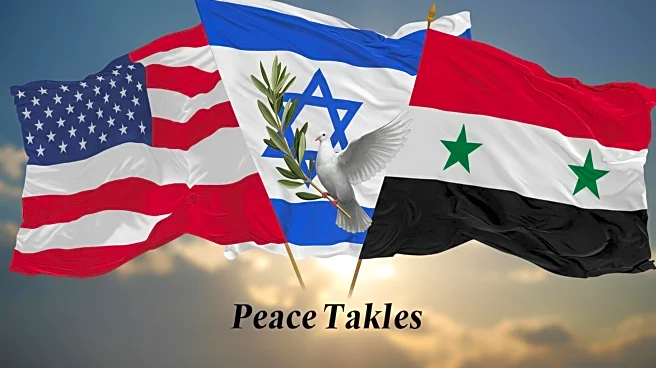What's Happening?
Israeli Strategic Affairs Minister Ron Dermer met with Syrian Foreign Minister Asaad al-Shibani in Paris to discuss reducing tensions and enhancing stability in southern Syria. The meeting, facilitated by U.S. special envoy Tom Barrack, focused on de-escalation, non-interference in Syria's internal affairs, and the reactivation of the 1974 disengagement agreement. This agreement established a demilitarized zone between Israeli and Syrian forces, monitored by a United Nations peacekeeping force. The talks aim to prevent the entrenchment of hostile forces like Hezbollah and Iranian troops in southern Syria, with proposals to deploy non-heavy armed security forces in the border area. The discussions also included the potential establishment of a humanitarian crossing to deliver aid to the Druze community in Sweida, amidst ongoing conflicts between Bedouin tribes and Druze militias.
Why It's Important?
These talks are significant as they represent a rare opportunity for cooperation between Israel and Syria, two historically adversarial nations. The discussions could lead to a framework for broader security cooperation and potentially normalize relations between the countries. For Syria, engaging in dialogue with Israel and strengthening ties with the U.S. could bolster its international legitimacy. However, concessions by the Syrian regime could be seen as treasonous domestically, risking public support. For Israel, the talks are crucial to ensuring security along its borders and preventing hostile entities from gaining a foothold in southern Syria. The outcome of these negotiations could impact regional stability and influence U.S. foreign policy in the Middle East.
What's Next?
If successful, the talks could lead to the implementation of a security agreement that limits military activity in southern Syria and establishes a humanitarian crossing for aid delivery. The U.S. continues to support efforts that promote lasting stability and peace in the region, aligning with President Trump's vision for a prosperous Middle East. However, the Syrian regime's willingness to cooperate and the potential establishment of Druze autonomy remain contentious issues that could affect the negotiations' progress.
Beyond the Headlines
The discussions highlight the complex dynamics of Middle Eastern geopolitics, where historical rivalries and ethnic tensions intersect with international diplomacy. The potential establishment of Druze autonomy poses a challenge to Syria's territorial integrity and could set a precedent for other ethnic groups seeking self-governance. The talks also underscore the strategic importance of U.S. involvement in facilitating dialogue between adversarial nations, aiming to foster peace and stability in a volatile region.








